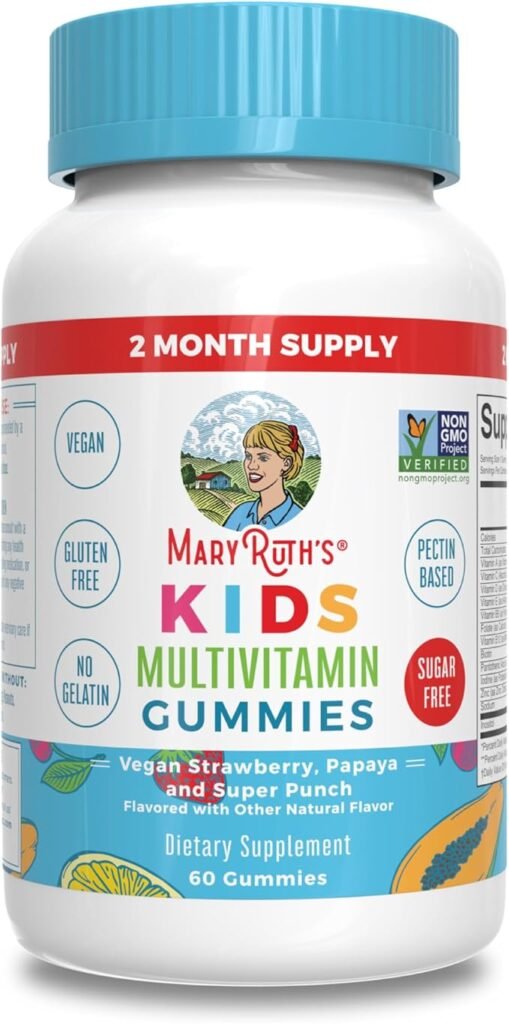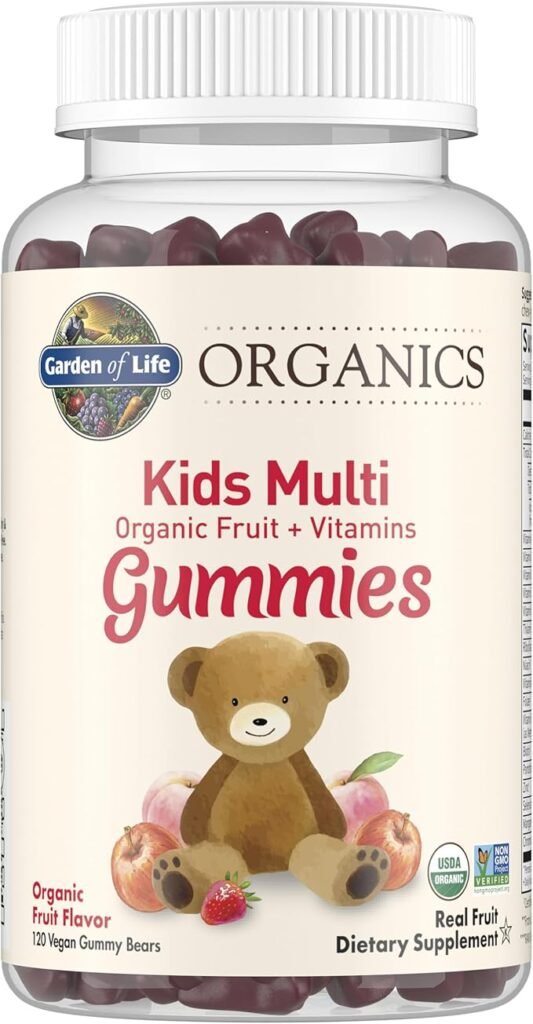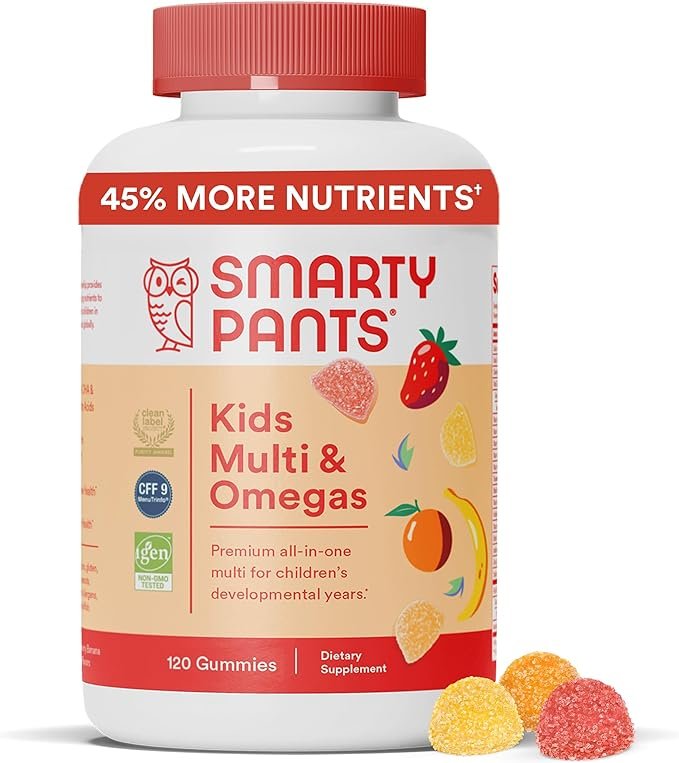In today’s world, where busy schedules and fast food availability often overshadow a balanced diet, some parents are growing increasingly concerned about their children’s health and nutrition. Ensuring that kids receive all the necessary nutrients is a critical aspect of their growth and their overall well-being.
Vitamins play a pivotal role in supporting good immune function, bone health, and cognitive development, among other essential bodily functions. Some people may find it challenging to constantly provide a high-nutrient diet because of their lifestyle.
This is where the natural multivitamins found in youngsters come into play. Natural multivitamins provide a more all-encompassing way to improve kids’ diets. Rather than originating from synthetic materials, this may be obtained from actual meals. They aim to fill in nutritional gaps by providing essential vitamins and minerals that could be missing from their normal meals.This comprehensive guide will delve into the key benefits of integrating natural multivitamins into your child’s diet. We will explore the top vitamins essential for kids and also highlight their significance and their impact on health.
Additionally, we will discuss affordable natural multivitamin options available. Also to ensuring that budget constraints do not hinder your child’s access to these vital nutrients. By the end of this post, you will have a clear understanding of how natural multivitamins can contribute to a healthy and balanced lifestyle for your children.
Why Opt for Natural Multivitamins?
In recent years, the debate between synthetic and natural multivitamins has gained momentum, especially among health-conscious parents. One fundamental difference lies in the sources and processing methods. Synthetic vitamins are typically engineered in a laboratory using chemical processes. Whereas natural multivitamins are derived directly from whole food sources, such as fruits, vegetables, and herbs.
One of the most compelling reasons to choose natural multivitamins is their superior bioavailability. This refers to the body’s ability to absorb and utilize nutrients efficiently. Studies show that when natural vitamins are found in their complex whole-food form, the body can absorb them more easily. For example, studies published in the American Journal of Clinical Nutrition demonstrate that d-alpha-tocopherol, a naturally occurring form of vitamin E; is almost twice as efficient in terms of absorption and retention as dl-alpha-tocopherol, a synthetic version.
Also, another advantage of natural multivitamins is the lower risk of side effects. Synthetic vitamins often contain additives, fillers, and artificial colors, which may trigger allergic reactions or other adverse effects. Conversely, natural multivitamins generally have fewer synthetic compounds, reducing the likelihood of such issues. This aspect is particularly crucial for children, whose developing systems are more susceptible to irritants.
Another trend among health-conscious parents is the growing popularity of natural vitamins that are organic and non-GMO. Choosing organic products guarantees that the vitamins are free of dangerous chemicals and pesticides. On the other hand, vitamins produced from genetically unmodified sources are guaranteed by non-GMO certificates. These qualities complement the rising need for clean, sustainable nourishment and provide extra piece of mind. Nutritionists that specialize in pediatrics frequently recommend natural vitamins. Distinguished pediatrician Dr. Mary Jones observes that “natural vitamins, being closer in composition to the nutrients found in whole foods, are often better recognized and utilized by children’s bodies, potentially leading to more profound health benefits.”
Incorporating natural multivitamins into a child’s diet can constitute a significant step toward holistic health and well-being. Their enhanced absorption, reduced risk of side effects, and alignment with organic, non-GMO principles make them an increasingly attractive option for parents striving to provide the best for their children’s health.
Essential Vitamins for Kids
Ensuring children receive adequate vitamins is crucial for their overall growth and development. Vitamins such as A, B complex, C, D, and E play significant roles in maintaining healthy bodily functions. A balanced diet rich in natural food sources can provide these essential nutrients, minimizing the need for synthetic supplements.
Vitamin A: Vital for vision, immune function, and skin health, Vitamin A can be found in foods like carrots, sweet potatoes, and spinach. A deficiency may lead to vision problems, including night blindness, and can impair immune responses.
Vitamin B complex: Red blood cell development, cognitive function, and energy generation all depend on the B-complex vitamins, which include folate, B6, and B12. Nuts, chicken, and bananas all contain vitamin B6, which promotes healthy brain development. Found in meat, fish, and dairy products, vitamin B12 is essential for the production of red blood cells and the functioning of the nervous system. Leafy greens, legumes, and citrus fruits are rich sources of folate, which is essential for DNA synthesis and cell division. Anemia, exhaustion, and mental disorientation can be brought on by a diet low in B complex.
Vitamin C: Vitamin C, which is well-known for its antioxidant qualities, improves the absorption of iron and is necessary for tissue development and repair. Bell peppers, strawberries, and citrus fruits are all great providers of vitamin C. Scurvy, which is typified by weariness, gum disease, and skin problems, can be brought on by deficiency.
Vitamin D: Vitamin D, which is produced by the skin when exposed to sunshine and is present in fatty fish and fortified dairy products, is crucial for the absorption of calcium and the health of bones. Children who suffer from rickets due to a lack of vitamin D may develop weaker bones and skeletal abnormalities.
Vitamin E: Vitamin E is an antioxidant that helps maintain healthy skin and immune system function by shielding cell membranes. Vitamin E is abundant in nuts, seeds, and green leafy vegetables. Although infrequent, deficiency can result in visual issues and muscular weakness.
A varied diet with a range of fruits, vegetables, proteins, and whole grains can help correct deficiencies, even if supplements can also be helpful. This is still the greatest way to guarantee that children get all the vitamins they require for normal growth.
Top Natural Multivitamins for Kids
When considering natural multivitamins for kids, it’s essential to focus on products composed of high-quality, safe, and effective ingredients. Here, we present a curated list of recommended natural multivitamins available on the market, highlighting key features, pros and cons, price range, and recommended usage.
MaryRuth Organics Kids Multivitamin

MaryRuth Organics Kids Multivitamin stands out for its organic, non-GMO formulation. This multivitamin offers a blend of essential vitamins and minerals. Such as Vitamin C, D3, and B12, sourced from premium-quality, plant-based ingredients. The gummy formulation might be especially appealing for younger kids who have difficulty swallowing pills.
Key Features:
- Organic and non-GMO
- Gummy formulation for easy consumption
- Contains essential vitamins and minerals
- Vegan and gluten-free
Pros:
- Easy to administer
- No artificial flavors or colors
- Free from major allergens
Cons:
- Some children may not like the taste
- The price may be higher compared to other options
Price Range: $20-$30
Garden of Life Vitamin Code Kids

Garden of Life Vitamin Code Kids is another excellent choice, created with whole-food nutrition in mind. These chewable multivitamins offer a diverse blend of vitamins, minerals, and probiotics. All sourced from organic fruits and vegetables. The gummy form makes it a popular choice among children.
Key Features:
- Whole food nutritional base
- Contains essential nutrients and probiotics
- Chewable gummy form
- Non-GMO and vegetarian
Pros:
- Kid-friendly gummy format
- Supports digestive health with probiotics
- Derived from organic sources
Cons:
- May contain added sugars
- The price may be slightly on the higher side
Price Range: $15-$25
SmartyPants Kids Complete Multivitamin

SmartyPants Kids Complete Multivitamin Gummies are specifically formulated to address the broad nutritional needs of children. These gummies contain a comprehensive mix of vitamins and nutrients, including Vitamin D3, B12, and Omega-3 fatty acids sourced from sustainable fish oil.
Key Features:
- All-in-one multivitamin gummy
- Includes Omega-3 EPA & DHA
- Non-GMO and allergen-free
- Free from synthetic colors and flavors
Pros:
- Comprehensive nutrient profile
- Great taste
- Derived from high-quality ingredients
Cons:
- Contains fish oil, Non-suitable for vegetarians
- Relatively higher sugar content
Price Range: $13-$20
For Budget-Friendly Options:
Each product stands out for providing essential nutrients at an accessible price point, making it easier for parents to support their child’s health without compromising on quality.
OLLY Kids Multi + Probiotic Gummy: Offering a dual benefit of vitamins and probiotics, this gummy supports overall health and digestive balance. Ingredients include Vitamins A, C, D, E, and B, and a probiotic strain. Key pros are the inclusion of probiotics and a kid-friendly taste, while some may find the gummy texture less appealing. Priced approximately at $13-$15 for a bottle of 70 gummies, this option is both budget-friendly and convenient.
Rainbow Light Kids One Multivitamin: Known for its gentle-on-the-stomach formula. This chewable multivitamin supports immune health, energy production, and bone growth with its blend of vitamins A, C, D, E, and B. The price ranges from $15 to $20 for 90 tablets. Pros include its allergen-free attributes and whole-food base, while some parents might find the taste slightly medicinal.
L’il Critters Gummy Vites: A long-time favorite among children and parents alike. This gummy multivitamin is free from high fructose corn syrup, synthetic dyes, and gluten. Each serving provides essential nutrients like vitamins A, B12, C, D, and E. Costing around $9-$12 for 190 gummies, it offers great value. Pros are its wide availability and kid-approved taste. On the downside, it contains added sugars.
Choosing a natural multivitamin for kids that fits within a budget can be straightforward with these options. Each product stands out for providing essential nutrients at an accessible price point. Which makes it easier for parents to support their child’s health without compromising on quality.
Tips for Incorporating Vitamins into Your Child’s Routine
Incorporating natural multivitamins into your child’s daily regimen can be a seamless and beneficial process. To make vitamins more appealing, opt for forms that children find enjoyable, such as gummies or flavored liquids. These alternatives not only ease the administration but also transform the process into a delightful experience your child. Ensure products are free from artificial colors and preservatives and focus on natural ingredients that cater to your child’s health needs.
The secret to creating an effective routine is consistency. In order to establish a dependable routine, try to take the vitamins at the same time every day. Morning routines might be a great time to schedule this because they are usually less busy and easy to keep an eye on. You may include the vitamin-taking moment into another daily routine, like breakfast, to provide your youngster with a more systematic approach to nutritional enhancement. Pairing vitamins with meals is particularly valuable as it aids in better absorption of the nutrients. Most vitamins are best absorbed when taken with food, specifically a meal containing some fat, which aids in the assimilation of fat-soluble vitamins.
A useful tactic to consider is including your youngster in the process. Teaching kids the advantages of natural multivitamins may stimulate their curiosity and develop a sense of accountability. To promote a sense of freedom and independence. Let children select the taste or type of vitamin that best suits their needs while staying within reasonable bounds. Keeping a happy and upbeat attitude when giving vitamins can also have a beneficial effect on the child’s opinion of the procedure.
The accessibility and affordability of natural multivitamins are equally important factors to consider. With a wide range of options available, it is possible to find high-quality, natural supplements that fit within a family’s budget while still providing essential nutrients. Reading labels, consulting healthcare providers, and staying informed can make a significant difference in ensuring the best choices for your child’s health.
In Conclusion
Parents should remember that achieving optimal nutrition for their children is a gradual and ongoing process. While incorporating natural multivitamins can greatly enhance a child’s diet. Fostering a well-rounded approach that includes a balanced diet, regular physical activity, and sufficient rest is indispensable. Parents are making significant progress toward promoting their children’s well-being and long-term health by being proactive and knowledgeable. To all of you who are committed to helping your kids eat better, thank you for your worthwhile and significant efforts. You can make a big difference in your child’s long-term health and vitality by giving it thoughtful thought and making the appropriate decisions.
